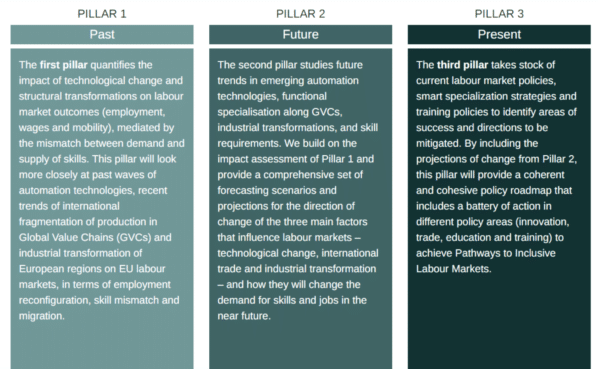PILLARS was a research project funded through the EU Horizon 2020 Research and Innovation Programme. The aim of the project was to inform policymakers, stakeholders and the public about the impact of technological change, international trade and industrial transformation on labour markets, as well as to support policymakers in the design of policies for inclusive labour markets, in view of future changes in technology. To achieve this, PILLARS had a three pillar framework of analysis, examining developments in the past, future and present.
The project was carried out between 2020 and 2023 by a consortium of ten partners of which Technopolis Group was a part of. Eight of these partners were based in Europe, one in China, and another in Latin America. More information about the PILLARS project partners can be found here. In addition, PILLARS was supported by the Scientific Advisory Board and the Expert Stakeholder Group on Future Technologies, Skills and Inclusive Labour Markets that consists of key experts and stakeholders from government, academia, industry and civil society.
The Three Pillars Framework:

Main insights
The project was further comprised by seven work packages. Technopolis Group was the leader of work package seven and also supported consortium partners in work packages three and six.
The future impact of automation technology uncovered In the “future pillar” Technopolis Group contributed to identify the impact of emerging automation technologies on industries and occupations. Through a real-time Delphi survey (1) and validation focus groups, the study aimed to answer:
- Which automation technologies are likely to emerge in the near future?
- Which industries and occupations will be most exposed to such technologies by 2030?
- Which firms (in which industries) are likely to adopt such technologies (and for which
tasks)?
More than 1,600 representatives from business, academia, and policy participated in the survey and up to 35 in the focus groups. The results of the study identified AI & Intelligent Information Systems and Computing as the two families of technologies most likely to affect industries, and Education and Human Health & Social Work Activities as the two industries most likely to adopt them. In terms of tasks, results identified “Analysing Data or Information”, and “Thinking Creatively” as the work activities most likely to be impacted by technologies such as Machine Learning and Neural Networks.
Best practices in policy to shape future labour markets:
Under the “present pillar” the study aimed to answer the question “which policies shape future labour markets?” Technopolis Group helped to identify good life-long training policies, migration policies, and regional smart specialisation policies in Europe. In combination, these policies aim at the stabilisation of labour market participation. Additionally, the study also provided insights into how changes in technology, trade, and specialisation and the related skill demand will affect the future of work. Lastly, the study established a coherent policy roadmap for socially inclusive responses to ongoing technological change.
Tools for designing future policies for inclusive labour markets
The work under the “present pillar” also aimed to co-design future policies for inclusive labour markets. The team set out to identify priority areas for the specific policy domains of the labour market that needed support; identify appropriate types of policy interventions; share good practices of existing policies; develop guidelines for developing strategies and projects for designing more resilient and inclusive labour markets; develop a toolkit on policy co-creation activities for regional governance on inclusive labour markets; and create an international stakeholder panel who would be participate in the co-creation of new policy opportunities. This part of the project was intended to serve as a bridge between the Horizon 2020 funded research and future policymaking.
Technopolis Group delivered several tools that can help and inspire policy makers to create future policies for inclusive labour markets:
The self-assessment tool was developed to help determine the preparedness of a region or country for inclusive labour markets in light of technological transformation. Based on the assessment, policymakers are suggested a list of policy objectives that require attention.
Ten regional case studies at NUTS2 level were conducted and published to be able to share good policy practices and lessons learned.
The findings of these regional case studies were further synthesised into short articles and summaries of key findings. In these articles, discussions on the impacts of automation technologies on the labour market, key concepts such as active and passive labour market policies in different EU regions, the role of public employment services in supporting inclusive markets, and other relevant topics, can be found.
Moreover, a collection of good policy instruments and practices found across the EU were compiled. The collection includes policy instruments associated with specific labour market effects, summaries of good policy practices extracted from case studies, and good practices that support (re)integration of specific vulnerable groups on the labour market. Specifically, we highlight good practices for young people/youth, women, low-skilled workers, migrants and ethnic minorities, people with disabilities or healthrelated conditions, individuals that live in peripheral areas, and older workers.
An action plan template and policy guidelines were also developed to further help policymakers in tailoring and implementing good policy practices that fit their needs.
The amalgamation of these outputs resulted in the Policy Toolkit, which can also be downloaded here. These deliverables were shared and validated with the Expert Stakeholder Group, as well as with policymakers, academics, and industry leaders at various workshops held in different EU countries.
Overall, the tool can serve as a source of ‘inspiration’ or an information bank for future policies, calls for proposals, and funding initiatives in the field of labour policy. Broader comments about the Toolkit acknowledged that the content is valuable and relevant for current policy challenges.
Final Thoughts
The project’s findings and tools present valuable insights that can significantly enhance policymaking in the areas of labour, industry, and technology. By leveraging these resources, policymakers can develop more effective strategies to address workforce challenges, drive industrial innovation, and foster technological advancement. It is crucial to integrate this knowledge into the decision-making process to ensure sustainable and inclusive economic growth. For more information, please refer to the project website.
(1) A Delphi survey is a widely used research method to conduct foresight studies, it aims to obtain some form of consensus (or not) among experts on a given topic about future scenarios (Rowe et al., 2011). A real-time Delphi increases efficiency and the number of participants, by providing immediate feedback and decreasing attrition (Gnatzy et al., 2011) between rounds.





